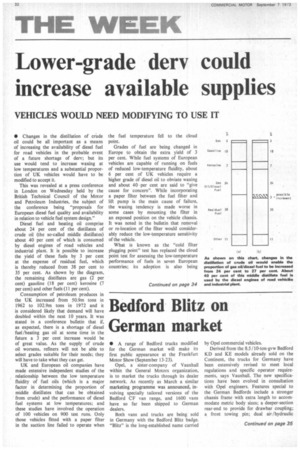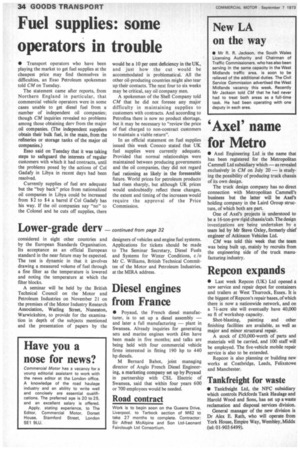Lower-grade dery could increase available supplies
Page 34

Page 36

If you've noticed an error in this article please click here to report it so we can fix it.
VEHICLES WOULD NEED MODIFYING TO USE IT
• Changes in the distillation of crude oil could be all important as a means of increasing the availability of diesel fuel for road vehicles in the probable event of a future shortage of derv; but its use would tend to increase waxing at low temperatures and a substantial proportion of UK vehicles would have to be modified to accept it.
This was revealed at a press conference in London on Wednesday held by the British Technical Council of the Motor and Petroleum Industries, the subject of the conference being "proposals for European diesel fuel quality and availability in relation to vehicle fuel system design."
Diesel fuel and heating oil comprise about 24 per cent of the distillates of crude oil (the so-called middle distillates) about 40 per cent of which is consumed by diesel engines of road vehicles and industrial plant. It is possible to increase the yield of these fuels by 3 per cent at the expense of residual fuel, which is thereby reduced from 38 per cent to 35 per cent. As shown by the diagram, the remaining distillates are gas (2 per cent) gasoline (18 per cent) kerosine (7 per cent) and other fuels (11 per cent).
Consumption of petroleum produces in the UK increased from 50.9m tons in 1962 to 102.9m tons in 1972 and it is considered likely that demand will have doubled within the next 10 years. It was stated in a conference bulletin that if, as expected, there is a shortage of diesel fuel/heating gas oil at some time in the future a 3 per cent increase would be of great value. As the supply of crude oil worsens, refiners will not be able to select grades suitable for their needs: they will have to take what they can get.
UK and European oil companies have made extensive independent studies of the relationship between the low temperature fluidity of fuel oils (which is a major factor in determining the proportion of middle distillates that can be obtained from crude) and the performance of diesel fuel systems at low temperatures; and these studies have involved the operation of 100 vehicles on 900 test runs. Only those vehicles fitted with a paper filter in the suction line failed to operate when the fuel temperature fell to the cloud point.
Grades of fuel are being changed in Europe to obtain the extra yield of 3 per cent. While fuel systems of European vehicles are capable of running on fuels of reduced low-temperature fluidity, about 6 per cent of UK vehicles require a higher grade of diesel oil to obviate waxing and about 40 per cent are said to "give cause for concern". While incorporating a paper filter between the fuel filter and lift pump is the main cause of failure, the waxing tendency is made worse in some cases by mounting the filter in an exposed position on the vehicle chassis. It was noted in the bulletin that removal or re-location of the filter would considerably reduce the low-temperature sensitivity of the vehicle.
What is known as the "cold filter plugging point" test has replaced the cloud point test for assessing the low-temperature performance of fuels in seven European countries; its adoption is also being considered in eight other countries and by the European Standards Organisation. Its acceptance as an official European standard in the near future may be expected. The test is dynamic in that it involves drawing a measured volume of fuel through a fine filter as the temperature is lowered and noting the temperature at which the filter blocks.
A seminar will be held by the British Technical Council on the Motor and Petroleum Industries on November 21 on the premises of the Motor Industry Research Association, Watling Street, Nuneaton, Warwickshire, to provide for the examination in depth of the subjects mentioned and the presentation of papers by the designers of vehicles and engine fuel systems. Applications for tickets should be made to The Seminar Secretary, Diesel Fuels and Systems for Winter Conditions, c /o Mr C. Williams, British Technical Committee of the Motor and Petroleum Industries, at the MIRA address.








































































































































